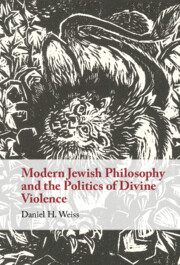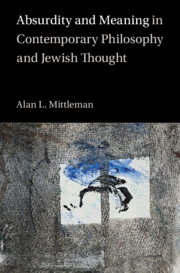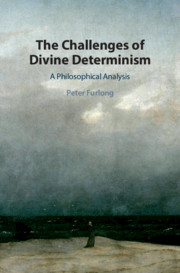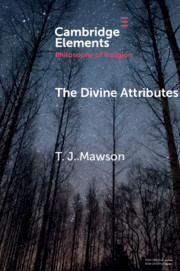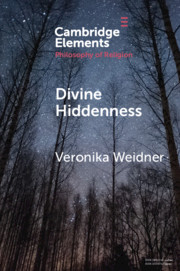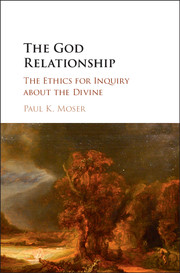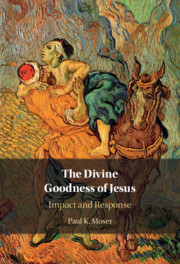Modern Jewish Philosophy and the Politics of Divine Violence
NZD$153.95 inc GST
- Author: Daniel H. Weiss, University of Cambridge
- Date Published: April 2023
- availability: Available
- format: Hardback
- isbn: 9781009221658
NZD$
153.95
inc GST
Hardback
Other available formats:
eBook
Looking for an inspection copy?
Please email [email protected] to enquire about an inspection copy of this book
-
Is commitment to God compatible with modern citizenship? In this book, Daniel H. Weiss provides new readings of four modern Jewish philosophers – Moses Mendelssohn, Hermann Cohen, Franz Rosenzweig, and Walter Benjamin – in light of classical rabbinic accounts of God's sovereignty, divine and human violence, and the embodied human being as the image of God. He demonstrates how classical rabbinic literature is relevant to contemporary political and philosophical debates. Weiss brings to light striking political aspects of the writings of the modern Jewish philosophers, who have often been understood as non-political. In addition, he shows how the four modern thinkers are more radical and more shaped by Jewish tradition than has previously been thought. Taken as a whole, Weiss' book argues for a fundamental rethinking of the relationship between Judaism and politics, the history of Jewish thought, and the ethical and political dynamics of the broader Western philosophical tradition.
Read more- Provides surprising new readings of four important modern Jewish philosophers
- Enables the reader to see the philosophical potential in classical rabbinic literature and to understand its underlying political orientation in new ways
- Highlights an alternative mode of reason that challenges typical understandings in the dominant Western philosophical tradition
Reviews & endorsements
'Bridging modern Jewish philosophy and classical rabbinic sources, Daniel Weiss argues that a commitment to divine sovereignty does not produce but rather mitigates human violence. Weiss offers new and compelling readings of a number of seminal modern Jewish philosophers, while also setting forth a provocatively fruitful vision of modern Jewish philosophy as not merely the product of modern Europe but rather as the rightful inheritor of classical Jewish thought. Anyone interested in Judaism, modern philosophy and indeed the relationship between religion and politics will have much to gain from this timely and important book.' Leora Batnitzky, Princeton University
See more reviews'Weiss shows the urgent relevance of both the classical rabbinic tradition and modern Jewish philosophy by reading each in light of the other – with unexpected results that challenge our understanding of human and of divine violence. What begins as a close study of surprising continuities within Judaism becomes a forceful critique of the Western philosophical tradition and its insufficient regard for the living individual.' Holger Zellentin, University of Tübingen
'Daniel Weiss has written a highly original consideration of the relationships between modern German-Jewish thought, classical rabbinic thought, and some of the core questions of political violence. Every thinker considered appears in a new light: Mendelssohn and Cohen are no longer so staid and bourgeois, Rosenzweig no longer so otherworldly, Benjamin no longer so disconnected from rabbinics. Instead, all four appear as rabbinic-anarchic critics of sovereign violence, articulators of an alternative mode of reason that challenges philosophy and political theology alike.' Samuel Hayim Brody, author of Martin Buber's Theopolitics
'With refreshingly careful treatment of Moses Mendelssohn, Hermann Cohen, Franz Rosenzweig, and Walter Benjamin, Weiss shows how their Jewish theopolitical thought is informed by rabbinic Judaism. Along the way he demonstrates that they have been poorly understood by their Christian and other mainstream critics, who in turn have subjected their thought to the terms of dominant discourses and imaginaries. Weiss thus walks the reader through a rich and inspiring landscape of these Jewish critical engagements with the structures of the modern state and its corresponding violence. Christian political theologians and others will find in Modern Jewish Philosophy and the Politics of Divine Violence a badly needed window for understanding early Christian theopolitics, which, considered without such Jewish sensibilities, have been systematically domesticated to authorize and fuel the violence of the modern state. I expect that the book will be for others what it has been for me, a gift for the imagination of a messianic politics.' Tommy Givens, Fuller Theological Seminary
Customer reviews
Not yet reviewed
Be the first to review
Review was not posted due to profanity
×Product details
- Date Published: April 2023
- format: Hardback
- isbn: 9781009221658
- length: 350 pages
- dimensions: 236 x 158 x 26 mm
- weight: 0.67kg
- availability: Available
Table of Contents
Introduction
1. Moses Mendelssohn and the rabbinic suspending of coercive punishment
2. Who can command violence, and who should obey? Mendelssohn on divine sovereignty and the limits of modern Jewish integration
3. Jewishness and the prophetic anarchism of Hermann Cohen
4. Franz Rosenzweig and the Jewish alternative to militarism
5. Walter Benjamin and the antinomianism of classical rabbinic Judaism
Conclusion: no other gods, no other masters.
Sorry, this resource is locked
Please register or sign in to request access. If you are having problems accessing these resources please email [email protected]
Register Sign in» Proceed
You are now leaving the Cambridge University Press website. Your eBook purchase and download will be completed by our partner www.ebooks.com. Please see the permission section of the www.ebooks.com catalogue page for details of the print & copy limits on our eBooks.
Continue ×Are you sure you want to delete your account?
This cannot be undone.
Thank you for your feedback which will help us improve our service.
If you requested a response, we will make sure to get back to you shortly.
×
